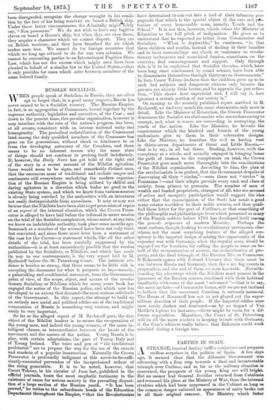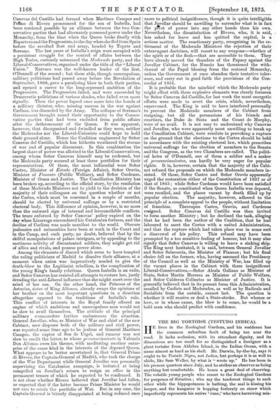PARTIES DT SPAIN.
ASTRANGE, ironical destiny baffles conjecture and prepares endless surprises in the politics of Spain. A few days ago, it seemed clear that the Alfonsist Government was advancing with a firm step towards a final and incontestable triumph over Carlism, and as far as the military situation is concerned, the prospects of the young King are still bright. But no sooner had General Jovellar returned from Catalonia and resumed his place at the Ministry of War, than the internal rivalries which had been seppressed in the Cabinet as long as the common danger enforced an appearance of unity broke out in all their original rancour. The Ministry which Seiler
Canovas del Castillo had formed when Martinez Campos and Palm di Rivero pronounced for the son of Isabella, had been rendered possible by an affiance between the two Con- servative parties that had alternately possessed power under the Monarchy, from the time when the Queen broke finally with Espartero and the Progressists, to the day when she fled from Spain before the revolted fleet and army, headed by Topete and Serrano. The last years of Isabella's reign were occupied with a persistent struggle for the control of affairs between the High Tories, curiously misnamed the Moderado party, and the Liberal-Conservatives, organised under the title of the "Liberal Union." Narvaez was the well-known leader of the first, O'Donnell of the second ; but these able, though unscrupulous, military politicians had passed away before the Revolution of September, 1868, gave a paralysing blow to both their parties, and opened a career to the long-repressed ambition of the Progressists. The Progressists failed, and were succeeded by Democratic politicians of various shades, who failed even more signally. Then the power lapsed once more into the hands of a military dictator, who, missing success in the war against Carlism, was discarded by the Army. The collapse of Serrano's Government brought round their opportunity to the Conser- vative parties that had been excluded from public affairs after the dethronement of the Queen. It was apparent, however, that disorganised and dwindled as they were, neither the Moderados nor the Liberal-Unionists could hope to hold their ground alone. Hence the Coalition engineered by Senor Canovas del Castillo which has hitherto weathered the storms of war and of popular discontent. In this combination the largest share of power was allotted to the Liberal-Conservatives, among whom Senor Canovas himself may be reckoned, but the Moderado party secured at least three portfolios for their representatives. Of these, the most influential were Senor Castro, Minister of Estado (Foreign Affairs), Senor Orovio, Minister of Fomento (Public Welfare), and Senor Cardenas, Minister of Grace and Justice. The Conciliation Ministry has been broken up, according to the official story, by the resolution of these Moderado Ministers not to yield to the decision of the majority of their colleagues on the question whether or not the Cortes, which must be convened in a couple of months, should be elected by universal suffrage or by a restricted electoral body. This difference of opinion, however, is no more than the outward sign of internal and irreconcilable conflicts. The truce enforced by Senor Canovas' policy expired on the day when Lizarraga surrendered his Catalonian fortress, and the decline of Carlism was made manifest to the world. Obscure jealousies and animosities have been at work in the Court and in the Camp, and each party, no doubt, believed that by the skilful manipulations of palace intrigues, or by appealing to the mutinous activity of discontented soldiers, they might get rid of allies and rivals, and possess power alone.
Among the elements of discord which seem to have tempted the ruling politicians of Madrid to dissolve their alliance, at a moment when union was imperatively needed to give the death-blow to the Legitimist rebellion, is the complication of the young King's family relations. Queen Isabella is an exile, and Senor Canovas has resisted all attempts to restore her, justly dreading the anti-Liberal influence that she might exert over the mind of her son. On the other hand, the Princess of the Asturias, sister of King Alfonso, already sways the opinions of her brother on the most important questions in a direction altogether opposed to the traditions of Isabella's rule. This conflict of interests in the Royal family offered an engine of which ambitious and unscrupulous men would not be slow to avail themselves. The attitude of the principal military commanders further embarrasses the situation. General Jovellar, who, as Minister of War and chief of the new Cabinet, now disposes both of the military and civil power, was reported some time ago to be jealous of General Martinez Campos, the captor of Seo de Urgel, and rumour was not slow to credit the latter, to whose pronunciandento in Valencia Don Alfonso owes his throne, with meditating another enter- prise of the same kind in the interests of the deposed Queen. What appears to be better ascertained is, that General Primo di Rivero, the Captain-General of Madrid, who took the charge of the War Department while General Jovellar was personally supervising the Catalonian campaign, is irritated at being compelled on Jovellar's return to resign an office in the permanent tenure of which he expected to be confirmed. It is not clear whether Rivero believed that Jovellar had fallen, or expected that if the latter became Prime Minister he would not care to retain the portfolio of War. But in any ease, the Captain-General is bitterly disappointed at being reduced once more to political insignificance, though it is quite intelligible that Szellar should be unwilling to surrender what is in fact the piTot of power into any other hands than his own. Nevertheless, the dissatisfaction of Rivero, who, it is said, has asked for leave and has quitted the capital, is a serious matter. The reactionary party, recognising in the re- tirement of the Moderado Ministers the rejection of their extravagant doctrines, will resort to any weapons—whether of the spirit or of the flesh—that are accessible to them. They have already moved the thunders of the Papacy against the Jovellar Cabinet, for the Nuncio has threatened the with- drawal of the Papal blessing from the restored Monarchy, unless the Government at once abandon their tentative toler- ance, and carry out in good faith the provisions of the Con- cordat of 1851.
It is probable that the mischief which the Moderado party might effect with these explosive elements was clearly foreseen by Senor Canovas del Castillo, for last week the most energetic efforts were made to avert the crisis, which, nevertheless, supervened. The King is said to have interfered personally to prevent the Moderado members of the Cabinet from resigning, but all the persuasions of his friends and courtiers, the Duke de Sesto and the Count de Murphy, were of no avail. It is not easy to understand why Canovas and Jovellar, who were apparently most unwilling to break up the Conciliation Cabinet, were resolute in provoking a rupture on the ground that the elections to the Cortes should be held in accordance with the existing electoral law, which prescribes universal suffrage for the election of members to the Senate and the Congress, as the two Chambers are called. The politi- cal heirs of O'Donnell, one of them a soldier and a maker of pronunciamientos, can hardly be very eager for popular rights. It is, however, certain that the majority of the Cabi- net refused the proposals on which the Moderado members in- sisted. Of these, Senor Castro and Senor Orovio apparently urged the restoration either of the Constitution of 1837 or of that of 1845; while Senor Cardenas would have been satisfied if the Senate, as constituted when Queen Isabella was deposed, were recalled, and the places vacant by death filled up by popular election. The majority, however, adhered to the principle of a complete appeal to the people, without limitation of franchise. Thereupon Castro, Orovio, and Cardenas
resigned. Senor Canovas del Castillo was then invited to form another Ministry ; but he declined the task, alleging that he had been the author of the Coalition, that he had laboured to meet the Cortes with a united Administration, and that the rupture which had taken place was in some sort a disavowal of his policy. This refusal may have been prompted by a too sensitive feeling of honour, but it may also signify that Senor Canovas is willing to leave a sinking ship. The King next hesitated, it is said, between General Jovellar and Senor Salaverria, the Minister of Finance ; but his final choice fell on the former, who, having assumed the Presidency of the Council as well as the Ministry of War, has filled up the vacant places in the Cabinet with three insignificant Liberal-Conservatives,—Senor Alcala Gallen() as Minister of State, Senor Martin Herrera as Minister of Public Welfare, and Senor Calderon Collantes as Minister of Justice. It is generally believed that in its present form this Administration, assailed by Cellists and Moderados, as well as by Radicals and Socialists from the outside, cannot last. The question is whether it will receive or deal a State-stroke. But whence or how, or in whose cause, the blow is to come, he would be a bold man who should predict with confidence.































 Previous page
Previous page